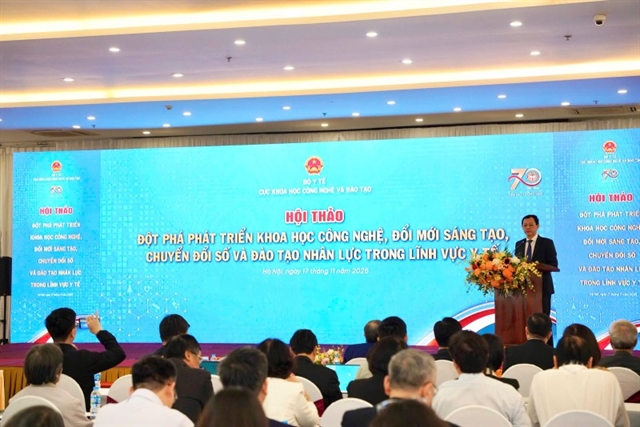 Society
Society

 |
| Deputy Minister Nguyễn Tri Thức speaks at the workshop on Breakthroughs in Science and Technology Development, Innovation, Digital Transformation and Human Resource Training in the Health Sector that took place on November 17 in Hà Nội. — Photo courtesy of Ministry of Health |
HÀ NỘI — The Ministry of Health, on November 17, organised a workshop on Breakthroughs in Science and Technology Development, Innovation, Digital Transformation and Human Resource Training in the Health Sector.
Speaking at the workshop, Deputy Minister Nguyễn Tri Thức affirmed that over the past years, the health care sector has achieved many progresses in science and technology development, innovation, digital transformation and human resource training.
In particular, there have been many outstanding achievements in science and technology when implementing Resolution No. 57-NQ/TW dated December 22, 2024 of the Politburo on breakthroughs in science and technology development, innovation and national digital transformation that helped bring about many new methods and products to serve the work of caring for, protecting and improving people's health, Thức told the workshop.
The Health Ministry has highly appreciated the meaningful contributions of management agencies, research institutes, professional associations and businesses to the progress, he said.
“The workshop is a venue for the Ministry of Health, scientists and experts to review the outcomes of implementing Resolution No.57 in the health sector and to outline directions for carrying out Resolution No. 71-NQ/TW, dated August 22, 2025 of the Politburo on breakthrough development in education and training; and Resolution No.72-NQ/TW, dated September 9, 2025, on key measures to strengthen the protection, care and improvement of public health,” the deputy minister said.
“At the same time, the 10th session of the 15th National Assembly is underway and expected to consider and adopt the amended Law on Education and the amended Law on Higher Education, as well as issue two resolutions to implement resolutions 71 and 72,” he said.
“The insights and dedication of the experts participating in the workshop are therefore expected to contribute to refining the institutional and policy framework within the health sector,” he said.
“In addition, medical training institutions must focus on preparing the necessary conditions for the upcoming National Licensing Examination, which will assess professional competence in accordance with the Law on Medical Examination and Treatment,” he added.
According to Dr. Nguyễn Ngô Quang, director of the Department of Science, Technology and Training (Ministry of Health), Resolution No. 57-NQ/TW serves as a call to action for the country’s intellectual community and scientists at home and abroad.
It encourages those engaged in scientific research, the application of new technologies and digital transformation to contribute to developing productive capacity, improving production relations, raising labour productivity and strengthening national competitiveness, thereby creating breakthroughs for the country’s socio-economic development.
Quang said that the group of strategic technological products in the health sector focuses on areas such as virtual assistants, specialised artificial intelligence, analytical artificial intelligence, large-scale data centres, traceability systems, new-generation vaccines, gene therapy and stem cell therapy.
So far, the Ministry of Health has developed a framework of breakthrough tasks for science, technology and innovation for the 2025-26 period.
In clinical medicine, five core tasks have been identified, including cell therapies (consisting of stem cells and immune cells), cell-based products for treating chronic and intractable diseases and for healthcare; personalised medicine; gene therapy; the development of new techniques and methods in Việt Nam for diagnosis, prevention, and treatment; and the integration of traditional and modern medicine.
In pharmaceuticals and medicinal materials, nine core tasks have been set, including the production of new-generation vaccines, biological medicines, immune-enhancing and immunomodulatory drugs; the development of medicinal plants, traditional medicine and herbal medicines; new drug manufacturing technologies; and dual-use medical products serving national defence, security and healthcare.
In medical technology and equipment, priorities include advanced and specialised technologies, devices and materials (3D printing, simulation, nuclear medicine, radiotherapy), robotics and automated equipment, in-vitro diagnostic products and green medical technologies.
In digital technology applications, the focus is on deploying AI in disease prevention, treatment and health management (geriatrics, cardiology, rare diseases, digital therapeutics and epidemic forecasting); building a national medical AI platform; applying big data in selected areas; and enhancing traceability systems.
For health policy, priorities similarly emphasise AI applications in disease prevention, clinical care and health management; developing a national health AI platform; expanding big-data applications; and strengthening traceability mechanisms.
“The total number of tasks and projects on breakthrough science, technology and innovation approved for implementation during 2025-2030,” Quang said.
At the workshop, delegates also heard presentations by experts, administrators and hospital leaders on scientific and technological development, innovation, health-sector digital transformation and medical workforce training; the regulatory direction and institutional framework for artificial intelligence in healthcare; ethical principles and governance guidelines for AI; and several current AI applications in the health sector. — VNS




